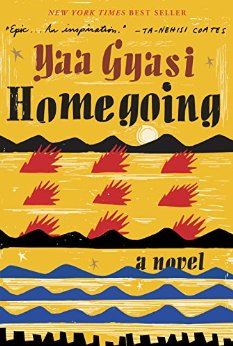 Trace the impact of slavery through two families over seven generations
Trace the impact of slavery through two families over seven generations
a review of Homegoing, by Yaa Gyasi
How different would your life be if you some major event had gone down differently in the life of an ancestor? Yaa Gyasi’s wonderful, ambitious novel Homegoing answers that question. Two sisters are separated in Africa’s Gold Coast in the 18th century, one sold into slavery and one the local wife of a British slaver. The chapters of the novel alternate between the two families, one evolving in West Africa and the other in the United States, with each chapter advancing the family by one generation. Over the course of 320 pages (or 13 hours, if you listen to the audiobook), we hear the stories of slaves, coal workers, drug addicts, as well as village leaders, individuals struggling with mental illness in rural, colonial Ghana, history professors, and poets. I loved it.
I listened to the audiobook narrated well by Dominic Hoffman, although I wish there had been a female narrator for the female protagonists.
If I haven’t convinced you, let Gyasi persuade you herself in just three minutes, here.
Here are a few lines that stuck with me:
- “Just because somebody sees or hears or feels something other folks can’t, doesn’t mean they’re crazy. My grandma used to say, ‘A blind man don’t call us crazy for seeing.’ ”
- “Those who had been determined to stay on the fence found themselves without a fence at all.”
- “Jo had worked hard so that his children wouldn’t have to inherit his fear, but now he wished they had just the tiniest morsel of it.”
- “Asante traders would bring in their captives. Fante, Ewe, or Ga middlemen would hold them, then sell them to the British or the Dutch or whoever was paying the most at the time. Everyone was responsible. We all were … we all are.”
- “Most people lived their lives on upper levels, not stopping to peer underneath.”
Here are a few pro reviews
- Steph Cha, LA Times: “‘Homegoing’ covers seven generations in 300 pages and is, for the most part, a blazing success.”
- Alyssa Rosenberg, Washington Post: “‘Homegoing is, to Gyasi’s credit, more interested in raising difficult questions than offering pat answers.”
- Michiko Kakutani, New York Times: “At its best, the novel makes us experience the horrors of slavery on an intimate, personal level; by its conclusion, the characters’ tales of loss and resilience have acquired an inexorable and cumulative emotional weight.”
I’ll even direct you to a few questions for discussion (here) for when you read this for your book group, which you absolutely should do.
